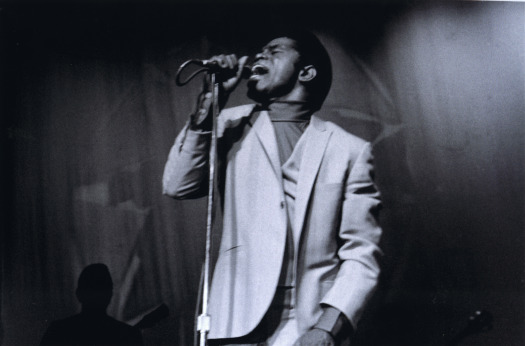
James Brown is undoubtedly one of the most influential entertainers in the history of American music and culture. Known as “The Godfather of Soul,” he is revered for his musical genius, social consciousness and promotion of black pride and economic empowerment.
Brown’s complex identity is examined in the two-hour plus HBO documentary, Mr. Dynamite: The Rise of James Brown. Directed by Oscar-winning filmmaker Alex Gibney and produced by rock music legend Mick Jagger, Mr. Dynamite is heavily sequenced with vintage photos, captions detailing the singer’s early years, concert footage, television appearances, Brown’s audio narration, news archives, tear sheets and studio recordings.
The film’s opening sequence is an energetic live performance featuring the then Afro-wearing performer covered in sweat. The segment sets the tone for an immersive music-filled eulogy that fully captures the essence of Soul Brother Number One’s flawless work ethic and uncompromising tyrannical governance.
The consummate entertainer conducts his band, inner circle and numerous enterprises with a zero tolerance authoritative style. He didn’t determine his repertoire until he got to the venue. He handed out fines for bad notes by simply using his hands mid-performance.
http://youtu.be/XXQsOa1Wbcs
Whenever the late funk, R&B, pop and soul music pioneer steps on-stage, “The Hardest Working Man in Show Business” mesmerizes audiences with his incredible footwork, vocal vamps, precise musical arrangements and commanding body language.
At the height of the Civil Rights Movement, Brown’s meteoric rise and business savvy prompted him to become among the first entertainers of color to leverage his superstardom with showmanship into a platform for entrepreneurship and social consciousness.
Mr. Dynamite avoids focusing on Brown’s jail time, family life, marriages and untimely death in 2006 by design. Pivotal episodes in the musical icon’s life like his visits to Africa and Vietnam are also not included in the final version because of time constraints.
“We only have two hours, so it’s hard to get all of that in there,” says Mr. Dynamite producer Blair Foster following a showing at BronzeLens Film Festival in Atlanta. “We had to sacrifice some things to let people enjoy the music as much as they could.”
The Emmy-winning producer worked closely with Gibney and Jagger to make Brown’s profound iconograph come to life. Admitting she feels weird about referring to the Rolling Stones lead singer by first name, Foster, who became exposed to Brown thorough his cameo in the 1980 film, The Blues Brothers, recalls Jagger pointing out political figures and cultural events while previewing a rough cut of the film.
Never one to deny his admiration of Brown, Jagger even gyrates his legs in one performance scene similar to Brown’s routine on The T.A.M.I. Show. “He’s not just a fan; he’s a student of James Brown,” says Foster. “He’s very open about how James is a big influence on him. It was a joy to fulfill his vision.”
It’s especially important to both Gibney and Jagger that Mr. Dynamite pays tribute to the musical and political elements that molded Brown into an icon. “We decided very early that we were not gonna focus on his entire life,” says Foster. “We wanted to remind people of his influence as a musician and a performer.”
Along with Jagger’s appreciation of Brown are commentaries from bassist Christian McBride, writer Greg Tate and drummer Questlove. Each appearance discusses Brown’s influences on mass culture.
The bulk of Mr. Dynamite’s interviews belong to Brown’s band members and close confidants like Rev. Al Sharpton, hype man Bobby Byrd, tour manager Alan Leeds, drummers Clyde Stubblefield, Melvin Parker and John “Jabo” Starks, saxophonists Maceo Parker and Alfred “Pee Wee” Ellis, trombonist Fred Wesley and bassist Bootsy Collins.
Each snapshot captures Brown’s off-stage persona: revealing his me-against-the-world attitude, tendency to tell corny jokes, implementing a strict dress code and his ability to articulate his sound and handing out penalties through his body language.
Danny Ray, Brown’s raspy-voiced announcer and cape man for 46 years, is an essential component to Brown’s live set. He’s definitely familiar with the meticulous performer not calling the set list until show time.
Laughing after each comment, Ray vividly remembers Brown’s strict instructions for his musicians.
“He used to say ‘Keep your eyes on me, and you won’t miss,’” remembers Ray well-dressed in a three-piece pinstripe suit and tilted fedora. “’It’s hard to get the public. If you stop, you gotta start all over again. Why stop? Keep going. That’s what you’re here for.’”
Ray shines light on how important it was for Brown to impress his audience: referring to stepping on-stage as “Star Time.”
“To [James], the big show was every night,” he says. “A lot of people say show business, but [James] said it was show and business. You wanna keep that thing while you got it going.”
It was common after a show for Brown and his band to head directly to the recording studio. “He didn’t want to miss nothing,” says Ray. “We were steady creating all the time.”
Brown’s daughter, Dr. Yamma Brown, calls Mr. Dynamite “a lesson or James Brown School” immediately before the screening. Her sister, Deanna Brown Thomas, is seated next to her.
At the time of the Atlanta premiere, the Brown siblings only saw bits and pieces of the full-length film. Thomas, formerly staffed at her father’s radio station, office and even his hair stylist at one point, jokes that when she thought she was on vacations with Brown, she would end up traveling with her him to different radio and television stations to promote.
She says that his prolific output is a reflection of his professionalism.
“This film is not as commercial as Universal,” says Thomas, also President of the James Brown Family Foundation. “He was more about his business off-stage than he was on-stage. To him, it was never too much downtime; he hardly wanted to take any time off.”
It didn’t occur to Brown’s daughters until later in both their lives that their beloved dad inspired talents such as Michael Jackson and Prince, who are both briefly shown in Mr. Dynamite mimicking their father’s dance routines.
“The amount of love everyone has shown us since dad passed has been tremendous,” says Dr. Brown. “It’s tough to lose a father but then to lose such an iconic man in music and history is a blow to the African American community, American people and worldwide. It’s a privilege for me to walk in his shadow.”
At BronzeLens, the audience at the Woodruff Arts Center’s Rich Theatre sings along, cheers, laughs and claps throughout the entire film. Each of the performances fuel euphoria. Foster, calling Mr. Dynamite her “dream project,” felt the success of the film when she heard the audience sing along.
“We succeeded, and I am happy to be a part of that,” says Foster.
The Brown sisters totally approve of Gibney’s depiction of their father’s legacy. Thomas clarifies that she wants millennials and younger generations to be educated on James Brown and his contributions to culture and society.
Dr. Brown is especially proud to see her father’s humanitarian side. “You see him singing and dancing, but what really spoke to him was seeing his people and kids prosper,” she says.
“Dad was a big giver. He really felt for where he came from. That’s a light you don’t really get a chance to see all the time.”
Mr. Dynamite: The Rise of James Brown premieres on Mon., Oct. 27 at 9 p.m. on HBO.
This post was written by Christopher A. Daniel, pop cultural critic and music editor for The Burton Wire. He is also a contributing writer for Urban Lux Magazine and Blues & Soul Magazine. Follow Christopher @Journalistorian on Twitter.
Like The Burton Wire on Facebook. Follow us on Twitter @TheBurtonWire.








